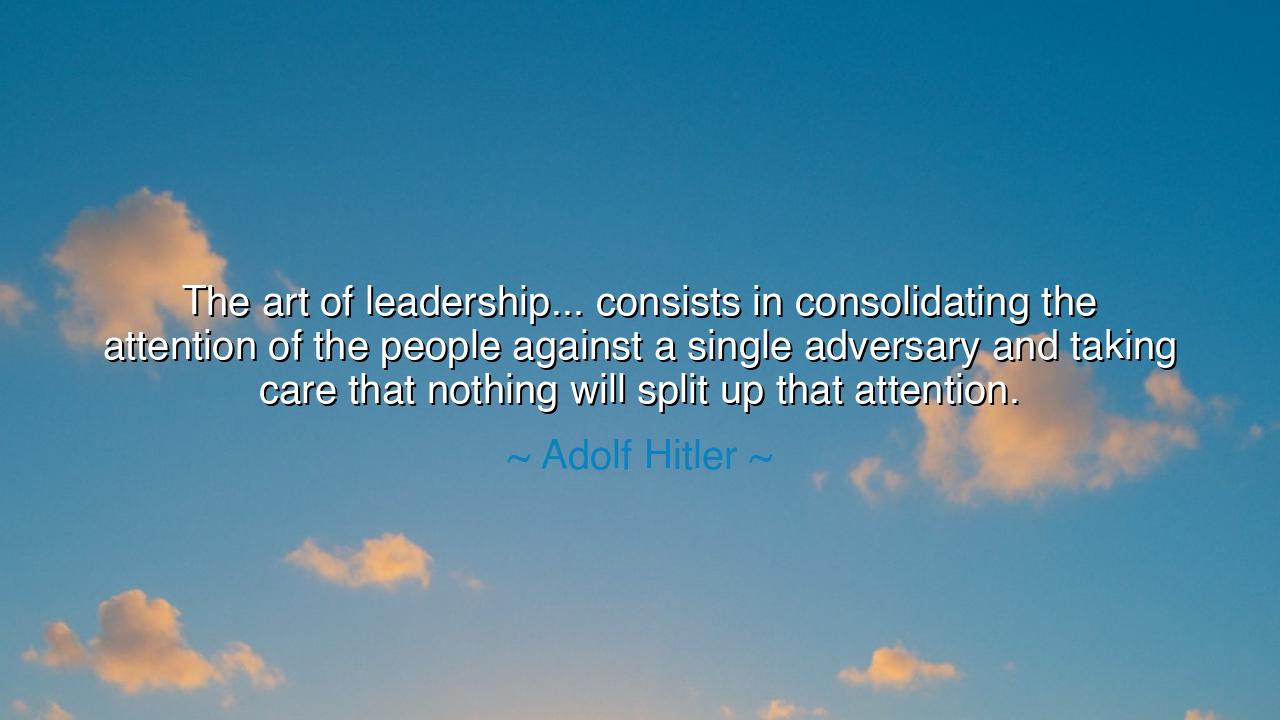
The art of leadership... consists in consolidating the attention
The art of leadership... consists in consolidating the attention of the people against a single adversary and taking care that nothing will split up that attention.






The words of Adolf Hitler—“The art of leadership... consists in consolidating the attention of the people against a single adversary and taking care that nothing will split up that attention”—stand as one of the most chilling and dangerous insights ever uttered about the nature of power. They reveal the dark craft of manipulation: the ability to unite through hatred, to forge strength not through virtue, but through the careful creation of an enemy. Beneath their cold logic lies a warning to all generations—that leadership, when severed from morality, can turn the hearts of millions into instruments of destruction.
Hitler’s statement does not describe true leadership; it describes the illusion of leadership, built upon fear and division. He recognized that the masses, when confused or suffering, seek clarity—and that the simplest clarity comes not from understanding, but from blame. Thus he fashioned an “adversary”, a single, monstrous enemy upon whom all frustrations could be projected. The technique was ancient: rulers from time immemorial have used external threats to bind their people in obedience. But Hitler perfected it. By turning attention toward one scapegoat, he turned the German nation into a weapon of his own making. What he called the “art” of leadership was, in truth, the science of deception—the art of controlling minds by narrowing their vision.
History offers countless warnings of this same danger. In ancient Rome, when corruption hollowed the Republic, politicians such as Lucius Sergius Catilina rallied the discontented by directing their rage toward imagined enemies—foreigners, aristocrats, conspirators. Later emperors used the same device, inventing plots to distract the people from tyranny. In every age, demagogues arise who promise unity, not through compassion, but through conflict. They convince the weary that their suffering has a face, that their pain can be cured by the destruction of another. Yet this is not unity—it is enslavement through illusion. True leadership enlightens; false leadership blinds.
The moral of Hitler’s strategy is as clear as it is terrible: people who surrender their critical thought to passion become vulnerable to the manipulator. To “consolidate attention” is to reduce the infinite complexity of human experience to a single point of hatred. It is to simplify the world into “us” and “them,” stripping away nuance, compassion, and reason. The moment a society accepts this simplification, it is already lost—for the fire that once burned against an external enemy will, in time, consume the people themselves. The tyrant’s first victory is not the conquest of nations, but the conquest of the human mind.
Yet from this darkness, a lesson of light may be drawn. To understand evil is to guard against it. Hitler’s words, though born of corruption, reveal a truth about human psychology—that the mind seeks unity and purpose, even at the cost of truth. Therefore, those who aspire to true leadership must offer a higher form of unity, one founded not on hatred, but on shared humanity. The wise leader directs the people’s attention not toward an enemy, but toward a vision—justice, knowledge, compassion, creation. Where the false leader builds walls, the true leader builds bridges. Where the deceiver points the finger, the enlightened points the way.
Consider Abraham Lincoln, who led a nation divided by war not by demonizing one side, but by calling all toward “the better angels of our nature.” He refused to exploit hatred, even when hatred would have made his task easier. In his leadership we see the opposite of Hitler’s doctrine: the courage to unite through understanding, to lead not by fear but by truth. So too did Nelson Mandela, who emerged from decades of imprisonment not to curse his captors, but to reconcile a nation. Such figures prove that power need not corrupt, that leadership can elevate rather than enslave.
The lesson of Hitler’s words is, therefore, both warning and command. Be wary of those who ask you to hate. Question the leader who offers enemies instead of solutions. Do not let your attention be “consolidated” by anger, nor your conscience numbed by collective passion. True strength lies not in shared resentment, but in shared purpose. To be a free people is to keep the mind awake—to resist the seduction of simple answers and to remember that every human being, even the one called “enemy,” reflects the same light of creation.
Thus, let his dark insight become our bright reminder: the art of leadership must never be the art of manipulation. It must be the art of awakening minds, not enslaving them. When a leader asks you to look outward in hatred, turn inward toward wisdom. When he demands blind loyalty, offer instead the loyalty of truth. For as long as we refuse to let our attention be bound by malice, the tyrant’s art will fail, and the human spirit—ancient, indestructible, and free—will prevail.






AAdministratorAdministrator
Welcome, honored guests. Please leave a comment, we will respond soon